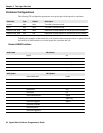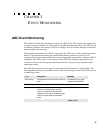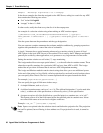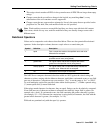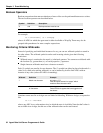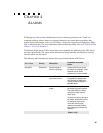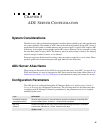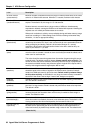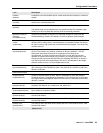
Chapter 3 Event Monitoring
32 Agent Data Unit Server Programmer’s Guide
Boolean Operators
Boolean comparisons that return evaluations of true or false can be performed between two values.
The two boolean operators are described below.
For example:
ts.1.s=Available | ts.1.s=WrapUp
selects all ADUs in which the agent state is either Available or WrapUp. Terms may also be
grouped with parentheses for more complex expressions.
Monitoring Criteria: Wildcards
Instead of specifying each individual instance of a set, you can use wildcard symbols to stand in
for other values. The wildcard symbols can be used in setting criteria given the following
restrictions:
Wildcard usage is restricted to the equal (=) relational operator. You cannot use wildcards with
the less than (<), greater than (>), or exactly equal to (:) operators.
Single character wildcards must have a character to match.
Each (?) symbol can stand in for one character. The (*) symbol can either be placed at the end of a
value (a so-called value trailing wildcard), or can be entered by itself to find ADUs with an
instance of any value (selects all ADUs as matching).
Container names used in an Assign can use limited wildcarding. Within an Assign, an expression
like
ts.*.s = Available
selects any ADU in any subcontainer in ts in which the state is Available. Note that the ! token is
not available in an Assign, but this use of the wildcard token can be used instead.
Symbol Definition Description
& and Both expressions must be true.
| or True if one or both expressions are true.
Wildcard Definition Example
? Match one character ts.1.ptype = ???
Find all couples named “ts.1.ptype” which
contain a three-character value.
* Match an unlimited number
of characters.
ts.1.s.logout = *
Find all ADUs for agents that have logged out of
the teleset.



